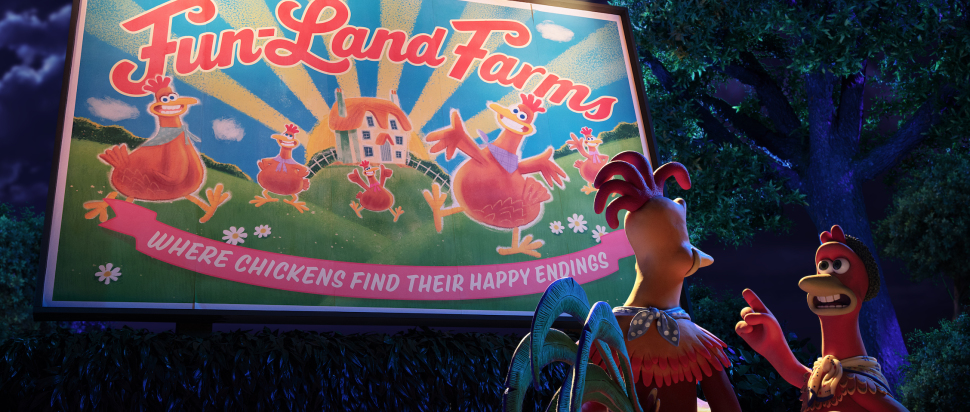Chicken Run and the Aesthetics of Self-Determination
Is Chicken Run 2: Dawn of the Nugget a potent analogy for colonialism? Are the escaped chickens crypto-Zionists? Our Theatre editor muses on the new Aardman animation
In a recent interview, Chicken Run: Dawn of the Nugget director Tom Nicholson told Empire that Chicken Island, the idyllic new home of the emancipated chickens of the beloved Aardman animation from 2000, is "Wakanda for chickens". For the uninformed, Wakanda is the name of the fictional African kingdom from Black Panther, a fantasy nation unaffected by European imperialism. What Nicholson seems to be pointing toward here is the parallel between Wakanda as a super-advanced oasis free from (white) hegemony and Chicken Island as an oasis free from…chicken farmers?
This does paint the original film in a new light. In Chicken Run, the chickens must band together to escape the farm before they are turned into pies. In the sequel, Ginger and her community must reckon with what they owe to other chickens still in captivity.
Throughout the first film, Ginger has to work hard to gain the support of the other chickens, even as their lives are under threat. "What part of 'They kill us' do you not understand?" she asks. Revolutionary philosopher Frantz Fanon writes that the "emergence of a nation" hinges on truth – the truth of what is in the barn (pie-related death) is part of what gets the rest of the chickens on board with Ginger's escape plan. Conversely, the success of the settler-colonialist state depends on control of 'truth'. The settler-colonialist government depends on the manufactured consent of its members, who must learn to prize their sovereignty over the sovereignty of those outside of their group, the boundaries of which are, in turn, defined and policed by the state.
"But Rho," you may be wondering, "Isn't this about chickens?"
It is.
And it is also specifically about the right of the chickens to self-determination – what they have to do to gain it, and how they defend it.
In the final scene of the first film, we see the shoddily re-painted sign on the newly christened Chicken Island. The neglected sign, which used to read, 'Bird Sanctuary', has been haphazardly edited to say, 'Chikin Sanctuary'. The semantic narrowing of the island's population from birds to chickens echoes the shrinking boundary necessitated by settler-colonialist interpretations of self-determination. We never learn what, if anything, happened to the sanctuary birds.
The arrival of the chickens in the outside world becomes a sanitised aesthetic of self-determination that feels central to settler-colonial interests. In settling Chicken Island, the chickens appear to displace no one, laying claim to a peaceful, green oasis that just so happens to have enough room for all. It's as if they come home to a pristine land that they have earned through their struggle – a land that, until their arrival, has been waiting for them.
Ecologically speaking, it's an interesting question – how much do the chickens, which are (pivotally) incapable of flight, pose a threat to the sky-borne bird populations already on the island? Or, because the sign is old, are we to assume that the bird sanctuary has already failed, and the birds have moved on (or been displaced)? If the addition of the chickens to the island's ecosystem means that a new population will be foraging for bugs, building structures, and shaping the land to fit their community, does that have any measurable impact?
The resounding answer in Chicken Run 2: Dawn of the Nugget is "no". The impact of the chickens on the island itself goes entirely unexamined. When the chickens erect a massive barrier around the island to block humans on the shore from seeing in, do they also effectively quarantine the bugs, hedgehogs, squirrels and other critters sharing the island with them? Are those animals, like the rats, Nick and Fletcher, sentient? Do they have a right to self-determination? And does this version of self-determination always come at a human (or animal) cost?
In the 2006 essay collection titled The Persistence of the Palestinian Question, Joseph Massad says: "It was the founder of the movement, Theodor Herzl, who, in his Zionist musings, understood that European Jews would have to establish their ethno-racial supremacy through demographic supremacy." Whiteness, Massad writes, is central to Zionist conceptions of Jewish self-determination. According to Herzl, the security of Jewish futurity depends on the strict policing of boundaries of Jewishness according to methods laid out by European imperialism. It is through these colonial methods that the settler population of Israel is figured as the only legitimate population of the region – the only one with the right to self-determination.
As a viewer, the only way to swallow Chicken Island is to imagine that the island represents some kind of divine providence – that it happened to be waiting, covered in greenery and all good things, for a population of escaped chickens to claim it as their home. On the island, the chickens build houses, transport and irrigation canals; they renovate the land, subjugating its wildness in a whimsical replication of good old English imperialism.
This is not to say that Chicken Island is chicken Israel, nor that the chickens are a stand-in for Zionists or for the Jewish people. If anything, the Chicken Run franchise remains studiously ignorant of settler-colonial dynamics, opting instead for a universally palatable narrative of righteous resistance. Chicken Run: Dawn of the Nugget isn't really about Chicken Island at all, because for the chickens, the origin of the land they inhabit is of no concern. For the chickens, the land is nothing but empty space – and the other creatures on it are invisible.
Chicken Run 2: Dawn of the Nugget is released in cinemas 8 Dec before streaming on Netflix from 15 Dec
